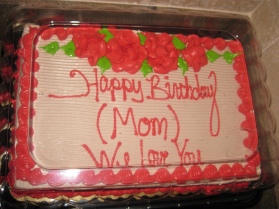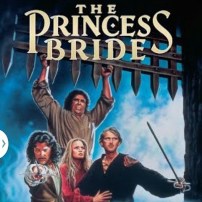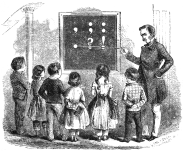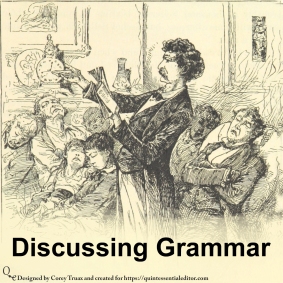 I like parentheses in the context of blogging. It allows me to sneak in all kinds of extra information. I probably overuse them a great deal in here, but honestly, I’m not scribbling the Magna Carta. I don’t seem to use them much in my storytelling. That doesn’t mean you can’t though!
I like parentheses in the context of blogging. It allows me to sneak in all kinds of extra information. I probably overuse them a great deal in here, but honestly, I’m not scribbling the Magna Carta. I don’t seem to use them much in my storytelling. That doesn’t mean you can’t though!
Note: parenthesis = singular & parentheses = plural
Let’s see how many times I screw that up.
Noah Lukeman, in his book A Dash of Style, offers an enjoyable definition of what parentheses can do. “Parentheses, on the other hand, respectfully interrupt you, so that you needn’t cease speaking or change your train of thought. Their interruption is more of an enhancement, like a trusted adviser whispering in your ear” (p. 112).
I like the idea of the trusted adviser whispering in your ear. I find the occasional use of parentheses in blogging, personal correspondence, and some works of fiction make the writing feel far more personal. The extra parenthetical insight provides a level of intimacy that is hard to achieve otherwise.
Let’s get to some applications already!
 Use them to enhance explanation or commentary. Sometimes you want to give the reader some extra information, but writing an extra sentence would be a pain. Maybe you want to relay a piece of information with a literary wink of the eye. Parentheses can do both of these things by sneaking bits of information into the middle of sentences. Just remember if you take out the parenthetical piece the sentence should still make sense.
Use them to enhance explanation or commentary. Sometimes you want to give the reader some extra information, but writing an extra sentence would be a pain. Maybe you want to relay a piece of information with a literary wink of the eye. Parentheses can do both of these things by sneaking bits of information into the middle of sentences. Just remember if you take out the parenthetical piece the sentence should still make sense.
- Corey was surprised (which is rare) to hear about what had happened to Thor.
- The amount of unhealthy food (donuts, pizza, ice cream) he ate was mind-blowing.
The extra information you give the reader in your parentheses can be a fragment (like above) or an entire sentence. If it is an entire sentence embedded within a larger sentence, you normally don’t capitalize the first word and the only applicable ending punctuation is a question mark or exclamation point. If the parenthetical sentence would end with a period, you don’t need to bother with it.
- Corey wanted to blast off into space (intergalactic travel had become common in 2096) with a donut in his hand.
- Corey looked at the dagger in his chest (how did that get there?) but didn’t stop crocheting.
If your parenthetical bit is separate sentence (not smashed in the middle of another sentence) you have some leeway with punctuation and capitalization. This leeway is your authorial power to shape words; wield it with gusto!
- Correct: Corey slayed zombies. (It took him three hours.)
- Also Correct: Corey slayed zombies (it took him three hours).
You can see in the above examples you get a slightly different feeling from both. They are both good to go (according to the somewhat contradictory grammar books I own).
 Use parentheses to introduce acronyms. Only do this if you are going to use the acronym more than once in the work.
Use parentheses to introduce acronyms. Only do this if you are going to use the acronym more than once in the work.
- Rodents of Unusual Size (ROUS) were introduced in The Princess Bride while Wesley and Princess Buttercup were in the Fire Swamp.
After you introduce the acronym, you can start using it without the parenthetical enclosure.
- Rodents Of Unusual Size (ROUS) were introduced in The Princess Bride while Wesley and Princess Buttercup were in the Fire Swamp. Wesley stated he didn’t believe they existed. Two seconds later a ROUS jumped on him.
Hate using the colon to list stuff? Use parentheses instead!
- Corey’s plan was to (1) gather all the blunt objects in the house, (2) put on as much protective clothing as he could wear, and (3) begin slaying the zombie horde.
Do numbers bore you? You can use letters too.
- Heather gave Corey a shopping list that included (a) diapers, (b) baby wipes, (c) baby food, and (d) twelve boxes of shotgun shells.
[Note: There was another example here. Swing down to the comments and read Thomas Weaver’s comment (The Wielder of the Red Pen of Doom). He pointed out an issue we will resolve another day. Thanks for setting this rambling man straight Thomas. I’m always happy when readers/editors are able to contribute and correct my errors!]
 A common confusion is punctuation within parentheses. Can you use it? How? Does the parenthetical sentence have to be complete to use punctuation?
A common confusion is punctuation within parentheses. Can you use it? How? Does the parenthetical sentence have to be complete to use punctuation?
The best explanation I have found that provided corresponding examples comes from June Casagrande’s book, The best punctuation book, period. This is a solid book on punctuation if you are looking for one.
“A question mark or exclamation point can come before or after a closing parenthesis, depending on whether it modified the whole sentence or the parenthetical alone” (p. 126). The following examples come from the same page and they are all acceptable uses. I admit some of them feel weird, but hey, we’re talking rules not style.
- Did you know they canceled the parade (due to the weather forecast)?
- They canceled the parade (can you believe it?).
- They canceled the parade (darn rain!).
- They canceled the darn parade (due to rain)!
Extra resources and books I like for punctuation.
- Parentheses in APA Style for Citations
- Specialized Uses from the Punctuation Guide Website
- The best punctuation book, period.
- A Dash of Style
- The Grammar Bible
- Eats, Shoots & Leaves
 That’s a wrap for today. I didn’t get into the technical mumbo-jumbo (referencing numbers, math, etc.) of parentheses, I instead focused on the most common uses I see in everyday writing. If you do have a technical question feel free to ask in the comment section. If I don’t have the answer (it happens) there are some awesome folks here that probably do.
That’s a wrap for today. I didn’t get into the technical mumbo-jumbo (referencing numbers, math, etc.) of parentheses, I instead focused on the most common uses I see in everyday writing. If you do have a technical question feel free to ask in the comment section. If I don’t have the answer (it happens) there are some awesome folks here that probably do.
Did I screw something up? Let me know so I can get it fixed! You will be given grammar points and I will link you into the article. I will also mail you a single strand of baby Thor’s hair, which is a powerful relic used for inter-dimensional travel. Do you use parentheses in your writing? If so, in what forms (personal correspondence, blog, fiction, non-fiction)? I’d be curious to know. Whew. Another grammar post down. Until tomorrow, keep reading, keep writing, and as always – stay sharp!

Great write-up! I don’t use them much in my fiction, but I can see how they an be useful on a blog.
LikeLiked by 2 people
I’m the same way as you. I’ve only seen them in a few pieces of fiction. I might try squeezing a few into my next work just to try it on for size. If it’s a fail, I can always chop it out in revision.
Thanks for taking some time to read today. Happy writing!
LikeLike
I always learn something with your articles! I usually use parentheses in replies or blogging, mostly because I ramble a lot as you know. I use them as commentary sometimes, other times as a way to include what I’m thinking while writing a sentence.
I sometimes use them in fiction. Not so much poetry for obvious reasons but if I’m writing a short story series then I may.
Great article!
Cheers! ^_^
LikeLiked by 1 person
We are both ramblers. But if not in blog land, where else can we ramble freely? It’s nice being the masters of our own little universes (webpages) here.
I was curious about whether or not you used them in poetry or not. That is a medium I enjoy reading (some poets more than others) but know little about in the way of actual application.
Thanks for reading today! Looking forward to reading your newest dark rantings later this evening.
LikeLiked by 2 people
You’re right, the blog is the place to use parentheses. If my insomnia keeps me up or wakes me up a billion times in the middle of the night it is very likely I will be posting the next entry sometime after midnight my time.
If not then it will be sometime after I get home from work tomorrow. I just got through the 3rd dungeon in the original Legend Of Zelda when you replied back! Hehe…can’t help but play some Zelda! Xp I was playing Monster Hunter Generations but that one is not as good as 4 in my opinion so I don’t play in greatly lengthy intervals like I have previous MH games.
Also the foggy haze that allergies have me going through is making it tricky to focus on a game like that. You need to focus on a game like that.
I look forward to your next article tomorrow!
Cheers! ^_^
LikeLiked by 1 person
P.S.- Poetry is a lot of things. It takes many forms. It is one of my favorite ways of storytelling and expression.
LikeLiked by 2 people
Great post! I love to use parentheses. I feel like they’re a really fun way for me to show more of my personality.
LikeLiked by 1 person
I agree with you on this one. In the way of fiction, I only tend to see it when you have a really “personal” sounding narrator, or in 1st person. But in blogs, emails, and most of my other personal correspondence I’m a parenthetical fiend.
Thanks for reading and leaving some thoughts today! Happy writing.
LikeLiked by 1 person
I use parentheses—thanks for teaching me how to use the plural!—once in a while, but I’m much more likely to rely on long dashes to convey that extra information. As, um, you can see by the previous sentence.
Is there a hard and fast rule about when to use one as opposed to the other?
LikeLiked by 1 person
The dash and the parentheses are closely linked. So much so that Noah Lukeman, in his book A Dash Of Style, joins them together and covers them both in one chapter. Their uses largely overlap with only a few obvious technical exceptions.
Most of the books I read state that dashes are more formal than parentheses. While the parenthetical aside is the adviser in your ear, the dash is the expert cutting in to tell you facts. The dash stops you and says, “YOU! Yeah you! Take a second and understand this before you keep reading.” Parentheses, on the other hand, don’t stop the eye long as you roll through them. Neither one is better than the other, they just have different purposes.
Here are three examples that show the different feelings:
Corey—the Quintessential Editor—offered an example. (Most formal/Telling)
Corey, the Quintessential Editor, offered an example. (A little less formal)
Corey (the Quintessential Editor) offered an example. (Pretty informal/Suggesting)
Application wise, the em dash is a chameleon. It can take the place of the colon, comma, or parenthesis if the author chooses. Each one of these has a different feeling (like I tried to show above). In serious fiction, I would recommend having the sentence written out in all forms and choosing the one that relays the emotion/feeling you were going with. Most really good line editors and copy editors (I’m not on this level just yet) do this in their heads as they look at the words on paper. They rip the punctuation out of the sentences, smash in alternatives, consider the scene, and suggest the best move. They do this all in a few seconds in their brains. Brilliant!
The only caution I would offer is the amount of usage. This goes for parentheses and dashes as well. An overabundance of parentheses or dashes usually tells us the author was a little scatterbrained when the put the work together. In first drafts or earlier writing, copy tends to be covered with lots of these punctuation marks. This is largely because the first draft is written for you. You know you will be the first set of eyes to see the manuscript again. You are leaving breadcrumbs for your future self. I don’t stress about lots of them in blogs because we are informal in the blogs.
Awesome question! Hopefully I touched on an answer? If not just shoot me another comment and I will try to clear it up. Thanks for reading today and leaving some solid questions and thoughts.
LikeLiked by 1 person
This was a perfect response, thanks! And, um, yes. I tend to overuse dashes, since I seem to dislike all the forms of punctuation they can masquerade as. 😛
LikeLiked by 1 person
Hah! Awesome 🙂 It certainly makes things simpler when you only deal with one punctuation mark! No more, “What would be the best mark to use in this situation…” You just toss in a dash and move on with life. I like it.
As for me, I will be over here carefully wasting away the hours considering all of the possibilities – until I go mad that is.
LikeLiked by 1 person
When I was younger (in my mid-teens), I overused dashes in fiction. I blame it on reading too many novels by Andre Norton back then.
Dashes are not more formal than commas; they’re just more abrupt, indicating a sharp ‘change in direction’ for the sentence. As such, they’re not appropriate for appositives (explanatory equivalent to a noun: “The Quintessential Editor” is an appositive to “Corey” in your examples). Parentheses are definitely less abrupt than dashes. Commas can set apart parenthetical phrases, too (because English grammar is weird, and punctuation is worse), but parentheses set them apart MORE than commas do, if that makes sense. Dashes and parentheses also stand out more than commas, so limiting their usage is usually a good idea.
“Most really good line editors and copy editors (I’m not on this level just yet) do this in their heads as they look at the words on paper. They rip the punctuation out of the sentences, smash in alternatives, consider the scene, and suggest the best move. They do this all in a few seconds in their brains.”
You make editing sound so violent (said the Wielder of the Red Pen of Doom — DOOM, I tell you! — with more than a touch of irony). 🙂
LikeLiked by 1 person
I’ve always thought of parentheses in two ways. In features and storytelling, they’re brief qualifying tidbits that the reader can glance at without interrupting the actual flow of the sentence. In blogs and personal narratives, they’re the inside joke with the reader (cause who doesn’t want to laugh now and then?). I also use them in my writing. They’re little notes to myself about things I want to delve into more deeply upon revision.
Thanks for the resource by the way.
LikeLiked by 2 people
Using them as an inside notation to yourself is a good point. Some writers use brackets, some parenthesis, some change the font color and write in caps lock. I, like you, prefer the soothing subtlety of the parentheses to leave my future self notes. After all, if revision wasn’t hard enough, bamboozling notes from your past self might just cause you to finally slip off the edge and fall into insanity.
Thanks for taking the time to read today bud!
LikeLiked by 2 people
THANK YOU FOR THIS! I have been playing with parenthesis a little more in my writing lately, and this bit of style guide on their use has been a life-saver!
LikeLiked by 1 person
I always encourage people to push out of their comfort zones and try whatever style is appealing to them. Writer fear (largely a self-imposed creature) prevents many writers from really tapping into their hidden potential.
Revision and editors will clean up problems down the road, but in the creation stage, be a mad scientist! Best of luck to you in your writing and thanks for stopping in and reading today. I’m glad you found something useful.
LikeLiked by 1 person
Great post, very practical. I love parentheses myself but find footnotes just as useful, especially for the purposes of flow. Personally, I use parentheses for short comments and footnotes for longer ones.
For example I’d include this thought in a footnote because while important, it’s kind of a bonus or fun fact that seems to disrupt the flow a little, at least for me.
“Intergalactic travel had become common in 2096.”
I really think footnotes are as underused as parentheses and I love both!
LikeLiked by 1 person
I also enjoy footnotes. One of the writers I’m working with is writing a sort of historical fiction work and uses footnotes delightfully. It’s like a hidden book inside of the book. It lends well to this sort of almost anthropological style of fiction he is using.
Thanks for sharing this insight and for reading. Maybe I’ll highlight the footnote one of these days!
LikeLiked by 1 person
That’d be awesome. I’d love to know how to use them more effectively! Thanks for an awesome post. 😉
LikeLiked by 1 person
Yes, yes, yes (cause I need all the help I can get)!!! Awesome post, Corey!
LikeLiked by 1 person
Hey Karen! Glad you found something useful in my rantings today. Grammar and punctuation are two of the most difficult parts of writing for me (and I’m not alone thankfully).
I hope you and Lonnie are doing well 🙂 I just looked at your, Pretzels: Dipped, Smothered & Covered! post and it gave me a mental sugar rush…in a good way.
LikeLike
I love parentheses in blogging! They’re perfect for my tangent-riddled thought process.
In fiction, I think I have used parentheses before to demonstrate the POV character’s thoughts without breaking up the sentence, but probably less commonly than in my posts.
LikeLiked by 1 person
I’ve seen authors do exactly what you are talking about and I’ve also seen them italicize those interior thoughts. I feel either of them work for me as long as it’s in moderation. Too many italics and my eyes start to go wonky and too many parentheses and it starts wearing me down. Everything in moderation I suppose.
Thanks for taking the time to read and share your process with us! Happy writing and revising. Speaking of this, I need to swing by your page and see how (or if) the revisions are going.
LikeLiked by 1 person
I prefer italics as a sort of inner monologue. I think it also serves as a sort of inside joke between the character and the reader, partially separate from the other characters.
Haha revisions have not started yet, but with my short story submission deadline looming on 8/31, I’ll have a chance to jump back in. September is revision month!
LikeLiked by 1 person
You have five whole days – yikes! Hopefully you just have some minor tweaks left to do. Good luck!
LikeLike
Oh my gosh. No. -.- The use of parentheses in this particular manner, while correct, frustrates the goodness out of me. It seems along the same line as the Oxford comma. Mandatory? No. Nice? Yes. However, I stand on the opposite side of the fence on the parentheses argument because I don’t like the excessive use of them. If you’ve written a sentence correctly, parentheses aren’t necessary. However, certain cases are acceptable.
E.g. Giving shorthand to scientific terms in papers.
Adding side note commentary such as in blog posts.
Not to mention, the punctuation you have described is allowable with the use of parentheses just makes me cringe. If the words within the parentheses is part of the sentence then it should follow the same punctuation marks. However, in one example you gave: “Corey slayed zombies (it took him three hours).” That just feels sooooo wrong to me. They’re separate sentences, parentheses or not, and I don’t feel that parentheses get to negate grammar and punctuation rules.
Ugh. Done. You probably don’t care about my tirade, but I just had to get it out there because it all looks so wrong.
LikeLiked by 2 people
Hah! I love a good tirade. Alas, these are not my rules. They are simply the rules of the road. It is 100 percent the authors choice as to how they steer the ship. As always, I’m just here with a compass pointing out cardinal directions.
I guess the point of these blogs, and what I am trying to accomplish, is to let writers know what tools are available to them. You hated the punctuation within parentheses, others may love it. Regardless of where we stand, we need to be aware of what we can do.
Stepping off the fence; here are my two cents. As a reader, as long as it’s not too overabundant I don’t mind. As an editor, as long as it’s grammatical sound (and meets the goal of the writer), it’s author prerogative. As a writer, I haven’t used them in my WIPs. Will I someday? Who knows.
Thanks for lending an alternative viewpoint of the parentheses game and for reading. I think it’s important for people to be aware of the different mindsets out there.
LikeLiked by 1 person
Ah. Yes. The rules of the road. *sigh* But it’s good that you’re offering writers the rules because sometimes they can be a bit tricky to find and understand. Laying them out is good for writers, novice and experienced.
Still, every time I have run across parentheses in books it has irked me. I don’t mind it in scientific writing as it serves a purpose and I don’t mind it in informal writing, such as on here (a blog). :p Though, I would never use it for my WIP. Personally, I don’t like the style. It has to be for a very specific personality-type of a character and I feel it takes away from the book. It acts like a sudden pause in what’s going on and that’s the last thing a writer should want in their novel.
LikeLiked by 1 person
Enjoyable, and educational! I shall be back to pick up more writing tips (WTs) in future 🙂 (I know, i’m doing it wrong!)
LikeLiked by 1 person
The fact you are even thinking about parentheses (and dreaded grammar) makes me smile. Mission accomplished in my book.
Thanks for the kind words!
LikeLiked by 1 person
I use a lot of parenthesis in my writing, usually when it’s more on the lighthearted side though. Always wondered if I was punctuating them correctly, now I know : D
Meno
LikeLiked by 1 person
Reblogged this on Still Another Writer's Blog.
LikeLiked by 1 person
Thanks a bunch, I appreciate it as always!
LikeLiked by 1 person
You are welcome. Your work is superb. It is certainly a resource for anything like Nanowrimo, upcoming in November.
LikeLiked by 1 person
I’d like to participate in Nanowrimo but I have too many irons in the fire these days! I love the event thought, it always gets people really excited about writing (and that gets me excited too).
LikeLiked by 1 person
Have you read “No Plot, No Problem?”
LikeLiked by 1 person
I have not. Should I be adding it to reading list?
LikeLiked by 1 person
Yes!
LikeLike
I don’t think I’ve ever used parentheses in fiction, which may surprise people who read my blog.
If the parenthesis is in running text you don’t need to toss a comma in front of it.
Right: Last week (when I saw him last) Corey was riding a Tyrannosaurus rex.
Wrong: Last week, (when I saw him last) Corey was riding a Tyrannosaurus rex.
You’re correct about not needing a comma with parentheses if you wouldn’t use the comma otherwise, but your example is confusing because you ought to use a comma after “Last week” anyway.
Thanks for the offer of something to help with inter-dimensional travel, but I don’t need it: I’ve already got that covered. 🙂
LikeLiked by 1 person
Let me spitball a second and tell me if I’m right or wrong before I change it.
I think the point you were making is valid depending on the authors intention. I’m going to write out an example for anyone reading the comments (because you already know this but others might not).
These are two correct examples of using, or not using, a comma in sentence that contains an introductory word or phrase. The introductory phrase in these examples is “On Tuesday”.
Right: On Tuesday he was wearing blue. (More of a statement.)
Right: On Tuesday, he was wearing blue. (More of a recollection).
I guess the point I was attempting to emphasis is that while the comma prior to a introductory word or phrase is optional, if you decide to chuck a parenthetical into the sentence it no longer is an option. Here are those examples I just offered with an extra bit added.
Right: On Tuesday (when I last saw him) he was wearing blue.
Wrong: On Tuesday, (when I last saw him) he was wearing blue.
By tossing in the parenthesis you have essentially eliminated the ability to set off the introductory phrase from the sentence with a comma. I think the idea behind this is that the parenthesis serves the function of the comma by signaling a pause.
So that was my thinking when I wrote this. Am I cooking with fire or am I burning down the house?
LikeLike
Actually, if you’d have a comma after the introductory phrase, but you have something in parentheses after that introduction, you’d put the comma AFTER the parentheses. The presence of a parenthetical phrase doesn’t change what happens in the rest of the sentence.
To quote The Chicago Manual of Style (6.53, Commas relative to parentheses and brackets), “When the context calls for a comma at the end of material in parentheses or brackets, the comma should follow the closing parenthesis or bracket.”
Like this: On Tuesday (when last I saw him), he was wearing blue.
A short introductory phrase doesn’t REQUIRE a comma after it, but longer ones (the guideline is to use a comma if the introductory phrase is three words or more) do, and you can use a comma after any introductory phrase if you choose.
Like this: Sometimes (but not always), Weaver puts his nose in other writers’ business.
LikeLiked by 1 person
I’m not sure if the image link worked (it’s my first time trying to do it in a comment). Regardless, I’m glad you chimed in with this information. One of the books I’m reading actually misrepresents the rule you just cited, but only a fool doesn’t side with the might of The Chicago Manual of Style. As always, I love that you correct my bumbling. It’s certainly challenging to write in-depth daily posts and keep it all straight and perfect. It’s the power of online collaboration and we all benefit from it. You get to flex the grammar muscles you already have, and the rest of us get to build new ones.
I’m going to figure out how to best revise the content. I might just omit that section for now and when (or if) I stray into comma land I’ll include it as an extra bit of information. Thanks again for taking the time to set me straight and elevate the value of my content. I try to stick with “big picture” editing tips as that’s what I’m good at (in my opinion). But when people toss me an email I try to address their question. Maybe I’ll just start forwarding those emails to you!
LikeLiked by 1 person
No image in the comment, but that could be because WordPress is being stupid today.
The Chicago Manual of Style usually agrees with me, so it must be right. 🙂 Also, it helps me explain grammar and punctuation to other people.
(I’ll tell you a secret: I make mistakes in my own blog posts sometimes. Yes, even the Wielder of the Red Pen of Doom — DOOM, I tell you! — has been known to drop a word or forget in the middle of a sentence that he ought to stick to English syntax when writing in English. Also, a cat walking across the keyboard or blocking the monitor with its fluffy butt can cause all sorts of typos that may not be caught in time.)
Feel free to send the grammar-and-punctuation questions my way, and I’ll try to help.
LikeLike